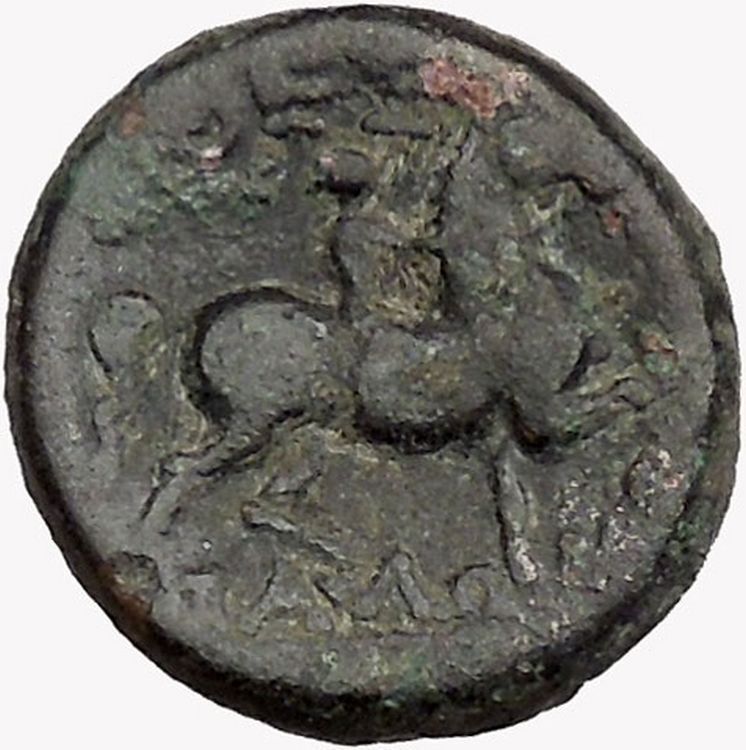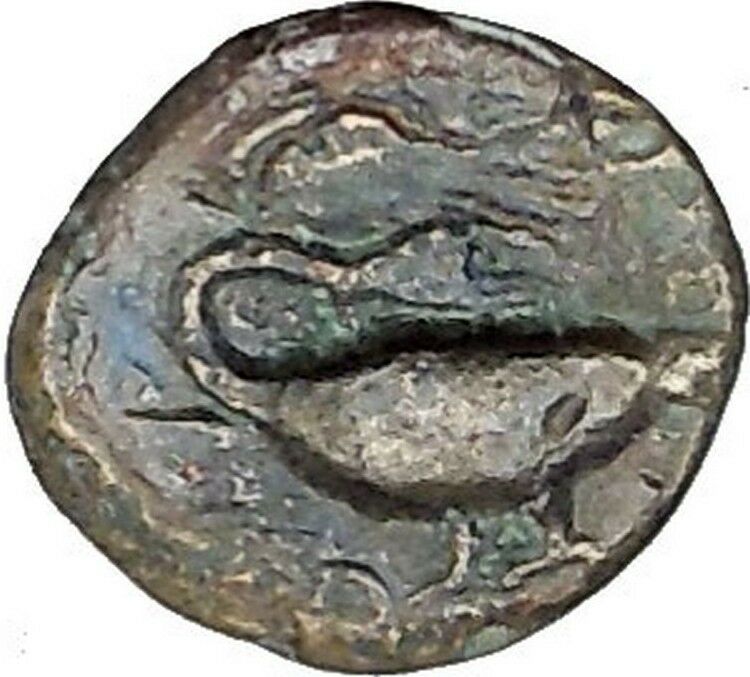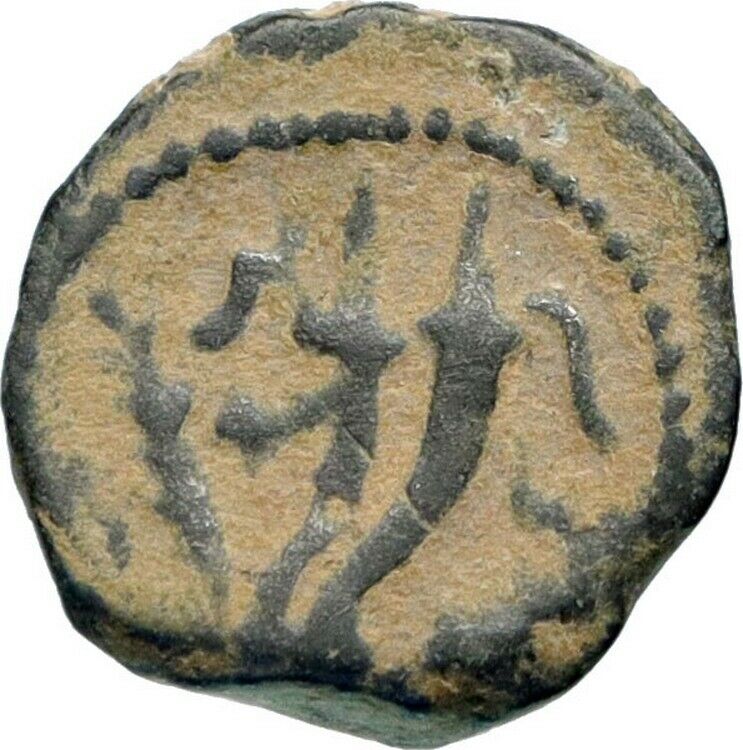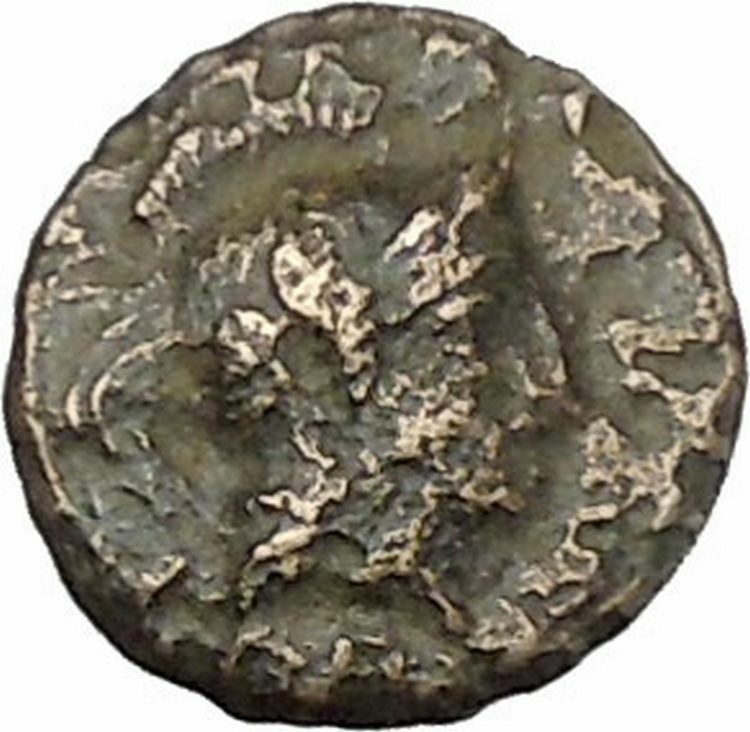Item: i37922

Authentic Ancient Coin of:
Greek city of Aitna in Sicily
Bronze 18mm (3.38 grams) after 210 B.C.
Reference: Sear 1018 var. (three dot in field to left and head left); Calciati III, S. 148, Em. 8
Radiate bust of Apollo right, wearing chlamys.
AITNAIΩN, Warrior standing facing, head right, holding spear and shield; three pellets in field to left.
The Syracusan colonists expelled from Katane in 461 B.C. founded a new settlement about ten miles to the north-west, ad to this place they transferred the name of Aitna which they had previously bestowed upon Katane.
You are bidding on the exact item pictured, provided with a Certificate of Authenticity and Lifetime Guarantee of Authenticity.
Click Here to See all Auction Items for Sale
If you click the above link you will see all auctions I have available for bidding on eBay.
There may be some great deals to be had, so check them out today.
|
|
 In Greek and Roman mythology, Apollo, is one of the most important and diverse of the Olympian deities. The ideal of the kouros (a beardless youth), Apollo has been variously recognized as a god of light and the sun; truth and prophecy; archery; medicine and healing; music, poetry, and the arts; and more. Apollo is the son of Zeus and Leto, and has a twin sister, the chaste huntress Artemis. Apollo is known in Greek-influenced Etruscan mythology as Apulu. Apollo was worshiped in both ancient Greek and Roman religion, as well as in the modern Greco-Roman Neopaganism.
In Greek and Roman mythology, Apollo, is one of the most important and diverse of the Olympian deities. The ideal of the kouros (a beardless youth), Apollo has been variously recognized as a god of light and the sun; truth and prophecy; archery; medicine and healing; music, poetry, and the arts; and more. Apollo is the son of Zeus and Leto, and has a twin sister, the chaste huntress Artemis. Apollo is known in Greek-influenced Etruscan mythology as Apulu. Apollo was worshiped in both ancient Greek and Roman religion, as well as in the modern Greco-Roman Neopaganism.
As the patron of Delphi (Pythian Apollo), Apollo was an oracular god – the prophetic deity of the Delphic Oracle. Medicine and healing were associated with Apollo, whether through the god himself or mediated through his son Asclepius, yet Apollo was also seen as a god who could bring ill-health and deadly plague as well as one who had the ability to cure. Amongst the god’s custodial charges, Apollo became associated with dominion over colonists, and as the patron defender of herds and flocks. As the leader of the Muses (Apollon Musagetes) and director of their choir, Apollo functioned as the patron god of music and poetry. Hermes created the lyre for him, and the instrument became a common attribute of Apollo. Hymns sung to Apollo were called paeans.
In Hellenistic times, especially during the third century BCE, as Apollo Helios he became identified among Greeks with Helios, god of the sun, and his sister Artemis similarly equated with Selene, goddess of the moon. In Latin texts, on the other hand, Joseph Fontenrose declared himself unable to find any conflation of Apollo with Sol among the Augustan poets of the first century, not even in the conjurations of Aeneas and Latinus in Aeneid XII (161-215). Apollo and Helios/Sol remained separate beings in literary and mythological texts until the third century CE.
Aetna (Ancient Greek: Αἴτνη, Aítnē), was an ancient city of Sicily, situated at the foot of the mountain of the same name, on its southern declivity. It was originally a Sicelian city, and was called Inessa or Inessum.
History
After the death of Hieron I and the expulsion of the colonists whom he had established at Catana (modern Catania), the latter withdrew to Inessa, a place of great natural strength, which they occupied, and transferred to it the name of Aetna, previously given by Hieron to his new colony at Catana. In consequence of this they continued to regard Hieron as their oekist or founder. The new name, however, appears not to have been universally adopted, and we find Thucydides at a later period still employing the old appellation of Inessa. It seems to have fallen into the power of the Syracusans, and was occupied by them with a strong garrison; and in 426 BCE we find the Athenians under Laches in vain attempting to wrest it from their hands. During the great Athenian expedition, Inessa, as well as the neighbouring city of Hybla, continued steadfast in the alliance of Syracuse, on which account their lands were ravaged by the Athenians. At a subsequent period the strength of its position as a fortress, rendered it a place of importance in the civil dissensions of Sicily, and it became the refuge of the Syracusan knights who had opposed the elevation of Dionysius the Elder. But in 403 BCE, that despot made himself master of Aetna, where he soon after established a body of Campanian mercenaries, who had previously been settled at Catana. These continued faithful to Dionysius, notwithstanding the general defection of his allies, during the Carthaginian invasion in 396 BCE, and retained possession of the city until 339 BCE, when it was taken by Timoleon, and its Campanian occupants put to the sword. We find no mention of it from this time until the days of Cicero, who repeatedly speaks of it as a municipal town of considerable importance; its territory being one of the most fertile in corn of all Sicily. Its citizens suffered severely from the exactions of Verres and his agents. The Aetnenses are also mentioned by Pliny among the populi stipendiarii of Sicily; and the name of the city is found both in Ptolemy and the Itineraries, but its subsequent history and the period of its destruction are unknown.
Location
Some doubt exists as to the site of Aetna. Strabo writes that it was near Centuripe, and was the place from whence travellers usually ascended the mountain. But in another passage he expressly says that it was only 80 stadia from Catana. The Antonine Itinerary places it at 12 M. P. from Catana, and the same distance from Centuripi; its position between these two cities is further confirmed by Thucydides. But notwithstanding these unusually precise data, its exact situation cannot be fixed with certainty. Sicilian antiquaries generally place it at Santa Maria di Licodia, which agrees well with the strong position of the city, but is certainly too distant from Catana. On the other hand San Nicolo dell’Arena, a convent just above Nicolosi, which is regarded by Cluverius as the site, is too high up the mountain to have ever been on the high road from Catana to Centuripi. Mannert, however, speaks of ruins at a place called Castro, about 4 km northeast from Paternò, on a hill projecting from the foot of the mountain, which he regards as the site of Aetna, and which would certainly agree well with the requisite conditions. This latter position is the consensus of most modern scholars.
Coinage
There exist coins of Aetna in considerable numbers, but principally of copper; they bear the name of the people at full, ΑΙΤΝΑΙΩΝ. Those of silver, which are very rare, are similar to some of Catana, but bear only the abbreviated legend AITN.
Your browser does not support JavaScript. To view this page, enable JavaScript if it is disabled or upgrade your browser.
Frequently Asked Questions
How long until my order is shipped?
Depending on the volume of sales, it may take up to 5 business days for shipment of your order after the receipt of payment.
How will I know when the order was shipped?
After your order has shipped, you will be left positive feedback, and that date should be used as a basis of estimating an arrival date.
After you shipped the order, how long will the mail take?
USPS First Class mail takes about 3-5 business days to arrive in the U.S., international shipping times cannot be estimated as they vary from country to country. I am not responsible for any USPS delivery delays, especially for an international package.
What is a certificate of authenticity and what guarantees do you give that the item is authentic?
Each of the items sold here, is provided with a Certificate of Authenticity, and a Lifetime Guarantee of Authenticity, issued by a world-renowned numismatic and antique expert that has identified over 10000 ancient coins and has provided them with the same guarantee. You will be quite happy with what you get with the COA; a professional presentation of the coin, with all of the relevant information and a picture of the coin you saw in the listing.
Compared to other certification companies, the certificate of authenticity is a $25-50 value. So buy a coin today and own a piece of history, guaranteed.
Is there a money back guarantee?
I offer a 30 day unconditional money back guarantee. I stand behind my coins and would be willing to exchange your order for either store credit towards other coins, or refund, minus shipping expenses, within 30 days from the receipt of your order. My goal is to have the returning customers for a lifetime, and I am so sure in my coins, their authenticity, numismatic value and beauty, I can offer such a guarantee.
Is there a number I can call you with questions about my order?
You can contact me directly via ask seller a question and request my telephone number, or go to my About Me Page to get my contact information only in regards to items purchased on eBay.
When should I leave feedback?
Once you receive your order, please leave a positive. Please don’t leave any negative feedbacks, as it happens many times that people rush to leave feedback before letting sufficient time for the order to arrive. Also, if you sent an email, make sure to check for my reply in your messages before claiming that you didn’t receive a response. The matter of fact is that any issues can be resolved, as reputation is most important to me. My goal is to provide superior products and quality of service.






